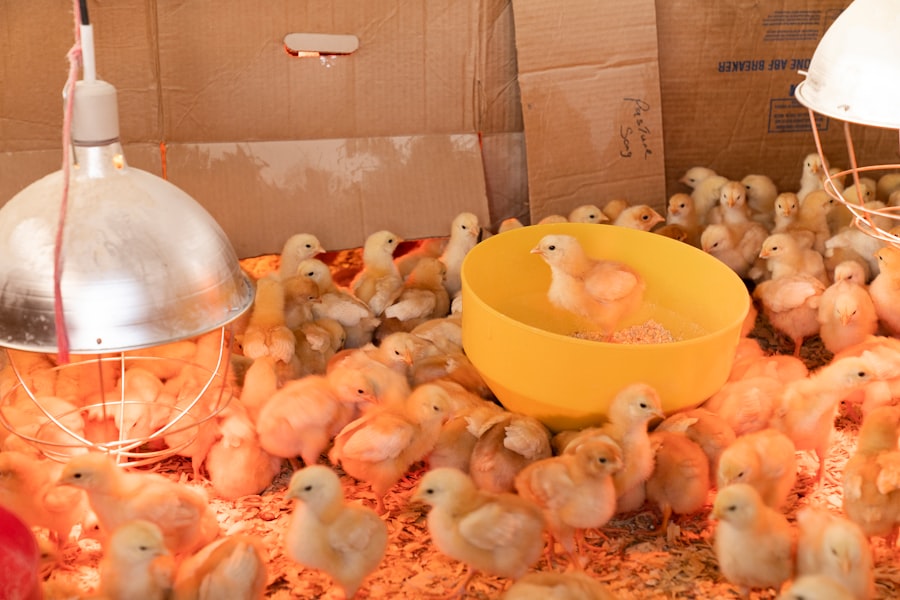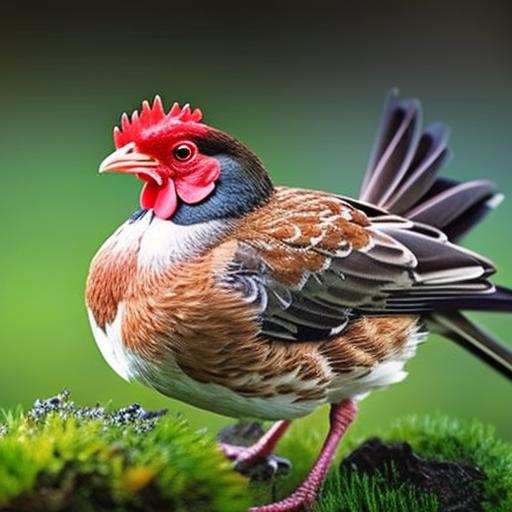Keeping chickens has a long and storied history that dates back thousands of years. The practice of raising chickens for their eggs and meat can be traced back to ancient civilizations such as the Egyptians and Romans. Over time, chicken keeping has evolved from a necessity for survival to a popular hobby for many people around the world.
There are several reasons why people choose to keep chickens. For some, it is a way to have a sustainable source of fresh eggs. Others enjoy the process of raising and caring for animals. Some people find that chickens make great companions and enjoy their company in the backyard. Whatever the reason, keeping chickens can be a rewarding and fulfilling experience.
Key Takeaways
- Keeping chickens has many benefits, including fresh eggs, pest control, and fertilizer production.
- Choosing the right breed is important for factors such as egg production, temperament, and climate adaptability.
- Preparing for chickens involves creating a safe and comfortable living space, as well as obtaining necessary supplies and equipment.
- Building a chicken coop requires careful consideration of factors such as size, ventilation, and predator protection.
- Feeding chickens a balanced diet and monitoring their health regularly are crucial for their well-being and egg production.
Benefits of Raising Chickens
One of the main benefits of raising chickens is having a constant supply of fresh eggs. There is nothing quite like going out to your backyard and collecting eggs that were laid just hours ago. Not only are fresh eggs delicious, but they are also more nutritious than store-bought eggs. They contain higher levels of vitamins and omega-3 fatty acids.
In addition to providing fresh eggs, chickens also produce high-quality fertilizer for your garden. Chicken manure is rich in nitrogen, phosphorus, and potassium, which are essential nutrients for plant growth. By composting chicken manure and adding it to your garden, you can improve soil fertility and promote healthy plant growth.
Chickens are also great for pest control. They love to eat insects, slugs, and other pests that can damage your garden. By allowing your chickens to free-range in your yard, you can reduce the need for chemical pesticides and keep your garden pest-free.
Lastly, chickens can provide companionship. They have unique personalities and can be quite entertaining to watch. Many people find that spending time with their chickens is a great way to relax and de-stress.
Choosing the Right Breed
When it comes to choosing the right breed of chicken, there are several factors to consider. First and foremost, you need to think about your purpose for keeping chickens. If you are primarily interested in egg production, then you will want to choose a breed that is known for its high egg-laying capabilities. On the other hand, if you are more interested in meat production, then you will want to choose a breed that grows quickly and has good meat quality.
Another factor to consider is the climate in which you live. Some breeds are better suited for cold climates, while others thrive in hot climates. It is important to choose a breed that can tolerate the weather conditions in your area.
For beginners, there are several popular breeds that are known for being easy to care for and friendly. Some of these breeds include the Rhode Island Red, Plymouth Rock, and Sussex. These breeds are known for their hardiness, docile temperament, and good egg production.
Preparing for Your Chickens
Before bringing home your chickens, there are a few things you need to do to prepare. First, you may need to obtain necessary permits or licenses from your local government. Some areas have restrictions on keeping chickens, so it is important to check with your local authorities before getting started.
Next, you will need to set up a budget for your chicken-keeping venture. This includes not only the cost of purchasing the chickens but also the cost of building or buying a coop, feed, bedding, and any other supplies you may need. It is important to factor in ongoing costs such as feed and veterinary care.
Finding a reputable breeder or hatchery is also crucial. You want to make sure that you are getting healthy chickens from a reliable source. Ask for recommendations from other chicken keepers or do some research online to find reputable breeders or hatcheries in your area.
Building a Chicken Coop
A chicken coop is essential for keeping your chickens safe and comfortable. When building a coop, there are several materials you will need. These include lumber for the frame, wire mesh for the walls and windows, roofing material, and hardware such as hinges and latches.
The size and location of the coop are important considerations. The coop should be large enough to comfortably accommodate your flock, with at least 4 square feet of space per chicken. It should also be located in a well-drained area that is protected from extreme weather conditions.
Safety considerations are also important when building a chicken coop. The coop should be predator-proof, with secure doors and windows to keep out predators such as raccoons and foxes. It should also have proper ventilation to prevent the buildup of ammonia from chicken droppings.
Chicken Coop Design and Layout

When designing your chicken coop, there are several features you will want to include. Nesting boxes are essential for providing a comfortable place for your hens to lay their eggs. Each hen should have her own nesting box, which should be filled with clean bedding such as straw or wood shavings.
Roosting bars are also important for chickens to perch on at night. Chickens naturally roost off the ground to feel safe and secure. The roosting bars should be placed higher than the nesting boxes and should be wide enough for the chickens to comfortably perch on.
Proper ventilation and lighting are also important considerations. The coop should have windows or vents that can be opened and closed to allow for fresh air circulation. It should also have adequate lighting to provide a natural day-night cycle for the chickens.
Feeding Your Chickens
Chickens require a balanced diet to stay healthy and productive. There are several types of feed available, including pellets, crumbles, and mash. Pellets are the most common type of feed and are easy to store and feed. Crumbles are smaller pieces of feed that are easier for young chicks to eat. Mash is a finely ground feed that can be mixed with water to create a wet feed.
The amount of feed you should give your chickens depends on their age and size. As a general rule, adult chickens should be fed about 1/4 to 1/3 pound of feed per day. It is important to monitor your chickens’ weight and adjust their feed accordingly.
In addition to their regular feed, chickens can also enjoy treats and supplements. Some popular treats include fruits, vegetables, and mealworms. However, it is important to remember that treats should only make up a small portion of their diet and should not replace their regular feed.
Health and Wellness of Your Chickens
Keeping your chickens healthy is essential for their well-being and productivity. There are several signs of a healthy chicken to look out for, including bright eyes, clean feathers, and a good appetite. It is also important to monitor their droppings, as any changes in color or consistency could indicate a health issue.
Common health issues in chickens include respiratory infections, parasites, and egg-laying problems. To prevent these issues, it is important to provide a clean and dry environment for your chickens. Regularly clean the coop and provide fresh bedding. It is also important to practice good biosecurity measures, such as washing your hands before and after handling chickens.
Finding a veterinarian who specializes in poultry is also important. They can provide guidance on preventive care, diagnose and treat any health issues that may arise, and provide vaccinations if necessary.
Egg Collection and Storage
Knowing when and how to collect eggs is important for maintaining their freshness and quality. Eggs should be collected at least once a day to prevent them from getting dirty or damaged. It is best to collect eggs in the morning when they are still warm from the hen’s body.
Proper storage techniques are also important to ensure the longevity of your eggs. Eggs should be stored in a cool and dry place, such as a refrigerator. They should be stored with the pointed end down to help maintain their freshness.
Using eggs in cooking and baking is a great way to enjoy the fruits of your labor. Fresh eggs can be used in a variety of recipes, from omelets and quiches to cakes and cookies. They add richness and flavor to any dish.
Troubleshooting Common Chicken Problems
Like any animal, chickens can sometimes experience problems that need to be addressed. One common issue is egg-laying problems. This can include issues such as soft-shelled eggs, shell-less eggs, or egg binding. These issues can be caused by nutritional deficiencies, stress, or other health issues. It is important to address these issues promptly to prevent further complications.
Aggression towards other chickens or humans is another common problem that chicken keepers may encounter. This can be caused by overcrowding, lack of socialization, or dominance issues within the flock. It is important to provide enough space for your chickens and to monitor their behavior closely.
Predators are another concern for chicken keepers. Common predators include raccoons, foxes, and hawks. To protect your flock, it is important to secure the coop with sturdy fencing and locks. You may also want to consider using deterrents such as motion-activated lights or noise makers.
Keeping chickens can be a rewarding and fulfilling experience. Not only do they provide fresh eggs, fertilizer for your garden, and pest control, but they also make great companions. By choosing the right breed, preparing for their arrival, building a suitable coop, and providing proper care and nutrition, you can enjoy the benefits of keeping chickens for years to come. So why not give it a try? You may find that raising chickens is a hobby that brings you joy and satisfaction.
If you’re a beginner looking to start keeping chickens, you’ll definitely want to check out Lee Faber’s comprehensive guide. However, if you’re interested in diving deeper into specific aspects of chicken keeping, such as the ideal floor for a chicken coop or how to properly insulate it, then you should definitely read the related articles on Poultry Wizard. Their article on the floor of a chicken coop provides valuable insights on choosing the right flooring material for your coop, while their guide on how to insulate a chicken coop offers practical tips to ensure your chickens stay warm and comfortable during colder months. Don’t miss out on these additional resources to enhance your chicken keeping journey!
FAQs
What are the benefits of keeping chickens?
Keeping chickens can provide a source of fresh eggs, fertilizer for gardens, and entertainment. Chickens can also help control pests in your yard and provide a sense of self-sufficiency.
What do I need to get started with keeping chickens?
To get started with keeping chickens, you will need a coop, a run, feeders, waterers, and bedding. You will also need to research local laws and regulations regarding keeping chickens in your area.
What kind of chickens should I get?
There are many different breeds of chickens to choose from, each with their own unique characteristics. Some popular breeds for beginners include Rhode Island Reds, Plymouth Rocks, and Leghorns.
How do I care for my chickens?
Caring for chickens involves providing them with fresh food and water daily, cleaning their coop and run regularly, and monitoring their health. You will also need to protect them from predators and provide them with a safe and comfortable environment.
What should I feed my chickens?
Chickens require a balanced diet that includes protein, carbohydrates, and vitamins and minerals. You can feed them commercial chicken feed, as well as fresh fruits and vegetables and occasional treats like mealworms.
How do I keep my chickens healthy?
To keep your chickens healthy, you should provide them with a clean and dry living environment, monitor their behavior and appearance for signs of illness, and take them to a veterinarian if necessary. You should also practice good biosecurity measures to prevent the spread of disease.
Meet Walter, the feathered-friend fanatic of Florida! Nestled in the sunshine state, Walter struts through life with his feathered companions, clucking his way to happiness. With a coop that’s fancier than a five-star hotel, he’s the Don Juan of the chicken world. When he’s not teaching his hens to do the cha-cha, you’ll find him in a heated debate with his prized rooster, Sir Clucks-a-Lot. Walter’s poultry passion is no yolk; he’s the sunny-side-up guy you never knew you needed in your flock of friends!







